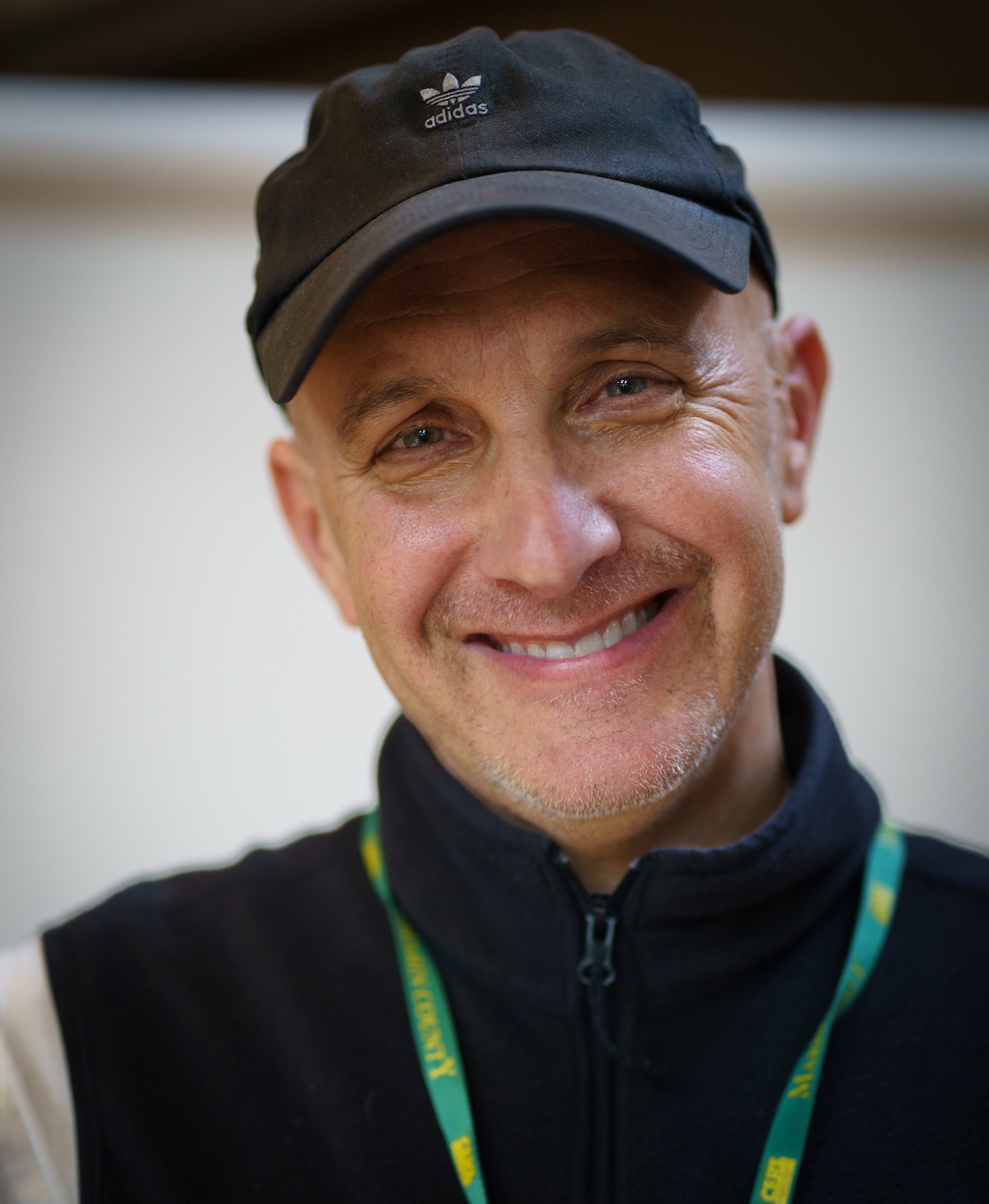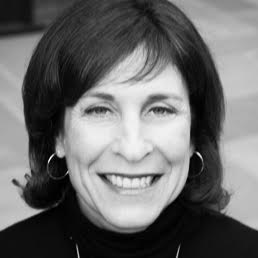
The Street Chaplaincy is an interfaith organization in San Rafael whose mission is to support unhoused and housing insecure people. The group meets this population where they’re at — literally and spiritually. This article is the story of how its executive director, Nick Morris, came to the cause.
Towards the end of his training at the San Francisco Theological Seminary, Nick Morris was looking for a place to live. It was 2015 and the cost of living in Marin County had nearly doubled in the six years since he started seminary, where he lived in subsidized housing.
“How do people that don’t have resources or have low paying jobs manage to live here?” he asked himself. He became interested in homelessness and heard about The Street Chaplaincy in San Rafael. Paul Gaffney, the non-profit’s director and chaplain invited Morris to join the group’s regular Tuesday dinner for those experiencing homelessness. It “felt like church,” Morris said to me, “people really sharing in their hearts.” He fell in love with the people, the gathering and “just getting to know folks who were experiencing homelessness.” How did they manage to make ends meet and survive on the streets?
Three years later, Morris became the group’s executive director. He and Rev. Charlotte Cramer preside at the Tuesday dinner, held in the multipurpose room at San Rafael’s First Presbyterian Church on Fifth Street, aided by volunteers from local churches and synagogues and a volunteer cook.
One Tuesday night, a crowd of about 25 gathered at the half dozen round tables with folding chairs. Dinner ingredients cost $11 total and were obtained from a local food bank. The meal “is more about community than food,” Morris said. He wore torn jeans and a baseball cap. Volunteers from the Church of the Nativity set out containers of stir-fry and rice buffet-style on a long folding table. Lemonade and bottles of water were put out to drink.
As the setup progressed, Rev. Cramer ushered the waiting group outside and formed a circle. She rang small meditation bells three times and passed them to the person next to her, telling the group to ring the bells any way preferred and when finished pass them to the next person, saying “welcome.” The scent of cooked chicken and rice wafted through the circle and sharp, clear notes chimed — the August Marin County sun was warm on t-shirts and sandaled toes. Anyone looking would have had a hard time — with a few exceptions — telling the housed from the unhoused.
The group moved indoors to a seated circle and Rev. Cramer played the shruti and read a poem by Rilke:
I come home from the soaring
in which I lost myself.
I was song, and the refrain which is God
is still roaring in my ears.
She held out a long feather, telling the group to share whatever they wanted when it was their turn with the feather. One woman with a big dog, wide smile, bangs and gray hair, looking like a local mother who just came from her garden, spoke about the difficulties of being without reliable bathroom facilities.
“No one talks about it,” she said. A few people nodded. The group sat down to dinner and Morris joined a table.
Early Interest in Religion
As a high school student Morris went with his family during several Thanksgivings to help in a soup kitchen. “There was something about it… There was like a seed planted… I could feel an energy that was attracting me.” His grandfather and uncle “ended up on the street” when they couldn’t afford rent. As a kid he read scripture from many religions: Christian, Jewish, Hindu, Buddhist, “making the connections between different faiths.” Morris said, “I’d been having what I would call spiritual experiences that I couldn’t explain, like, you know, knowing things before they would happen, kind of usually around death.” He read philosophers and poets. “My soul was, I don’t know… really hungry. And I also experienced a lot of physical illness…grew up in a pretty dysfunctional family affected by alcoholism and mental illness…what I since learned…” is that “trauma is something that propels people into these other dimensions.” He talks about William James, the psychologist, and his belief that the experience of trauma or suffering is one of the most common paths to religious or mystical conversions.
Morris’ interest in religion continued during boarding school. He attended chapel and would be the only person there. He dated Catholic girls and went to church with them on Sundays. “The parents loved me, but you know, they thought ‘this guy’s kind of weird. Why does he want to go to church with us?’”
A Calling
Post college, post public relations work at a large firm and a virtual reality company, Morris moved to Boulder, Colorado, in search of work “that really moved my heart.” He “hung out,” he said, “with the Tibetan Buddhists and meditated, prayed, and read… I really went inward.” He was looking for, he said, “what I would call truth.”
Morris moved to California and volunteered for the Institute for Noetic Sciences, based near Petaluma. He began to feel he was being called to become a “Christ follower…it was a very mystical Christianity that drew me.”
While at the Institute he found himself “wrestling with Christianity.” On his first day, the IT director approached him and asked, “Do you want to hear some music?” The director was the organist at a church in San Anselmo. During a rainstorm Morris drove to San Anselmo, not quite knowing where he was going. When he turned on Ross Avenue to head up to the church, he saw, on a hill, something that “looks like this castle up there, something that looks like Harry Potter… That’s the seminary.”
“And then I get to the church. All the doors were locked, but I could hear music, and I ended up finding an open door, and I sat in a pew, and the rain was beating on the stained-glass windows. It was all dark and beautiful music. Now that’s my home church.” Life, Morris said, is not linear. “It’s happening all at once, and so sometimes you tap into your future self in the present moment.”
Later, someone invited him to look at the seminary. When he saw it, he thought, “I know this place…I just kind of knew.”
He left the Institute and found work at a manufacturing company in an entry-level sales position. “It was like the best job I ever had… I like connecting with people,” he said, “and moving my body.” He worked at one of their stores in San Rafael, and “was focused on helping other people.” He became a regional manager, appreciating the teamwork, the people, the values of the corporation. But another path was calling. Torn between seminary and the company, he prayed for a sign from God.
One day, while at a church in Marin County, a Korean man from the congregation approached him.
“Are you studying?” he said. He taught at a doctoral program where they offered scholarships to Americans pursuing ministry. He offered Morris a scholarship.
Morris got his sign.
He was adopted into the Korean American community, interned at the Korean First Presbyterian Church and began seminary. Later, he was hired as a multicultural minister at the Good News Presbyterian Church in San Francisco.
One night, at the Good News church, Morris was speaking with congregants about welcoming the stranger, when a man wearing a polo shirt showed up, twitching. “Something smelled,” Morris said. Someone from the congregation stood up, gave him money, and the man disappeared. Morris wondered if they had just paid him to leave. He found him and asked why he left.
“You’re not accepting me,” the man said.
“I don’t know you,” Morris replied.
“You’re too much in your head,” the man said, “and not enough in your heart.” They were standing outside the church bathroom. No one went in or out. As Morris recalled, it was as if they were in a liminal space, where time stood still. He had been writing academic papers in seminary, feeling connected to God, higher power, Christ. The man’s comment resonated.
“You know what,” the man continued. “God wants you to use both your head and your heart.” He asked Morris, “Why are you doing this? Is this just a job to you?”
“No,” Morris replied, “it feels like a call.” And then Morris told him, “I wish church were more like my twelve-step group, you know, where people come in, and they admit they’ve opened their heart, and they admit their brokenness.” The man kept twitching. The smell was palpable.
“I felt the presence of the Christ energy,” Morris said. “It was powerful. I started to cry.” A few weeks later, driving home, he thought, “Your ministry is to the homeless.” Like a prophet from the Hebrew Bible, he tried to talk himself out of it, thinking, “I can’t do that, I really don’t want to do that.” But he heard a voice, and “it was so clear,” saying, “This is what you’re gonna do.”
As his 50th birthday neared, he wanted to do something out of the ordinary. After praying, he came up with the idea of holding a fundraiser for The Street Chaplaincy. He invited family and friends to join him at a Tuesday dinner for his birthday and contribute. The fundraiser exceeded his $5000 goal. He got contributions from around the world. After three years of raising money, the advisory board asked Morris to become the executive director. He’s proud that now, after years of operating independently, the group has “a seat at the table” and is an integral part of Marin County’s Continuum of Care.
The Unhoused on the Streets of San Rafael
These days Morris wears a lanyard identifying himself as director of the Street Chaplaincy when he walks the streets. He doesn’t have to go far from the church to find his constituency. Steps away, parked on a street adjacent to the church, he spots a white van. Morris knocks on a window.
“Robert?” he says. The window rolls down. Robert, sitting in the driver’s seat, greets him. He works a piece of leather, gleaned from a cast-away couch. His hair is short in front, long and curly in back. He wears two arm sleeves that stretch from elbow to wrist, also made from salvaged leather. The large pitbull in the back seat starts to bark, stopping when Robert quiets him.
Robert makes bookmarks and pouches, most of which he gives away. He gives Morris a braided bookmark. In mushroom season Robert goes to Northern California to gather and sell mushrooms. Robert, Nick says, is “high functioning.” Sometimes he sleeps in his car, sometimes he couch surfs. This is downtown San Rafael, the city and county seat of Marin County, with an average household income of $155,715, and a median home value, with a mortgage, of $1,081,700. Out of San Rafael’s population of over 60,000, nearly ten percent live below the poverty line.
Across the street, Morris spots Brandon, living in a tent next to the public library. Brandon is schizophrenic, Morris says. Brandon tells him he’s certain he’s being followed by the Coast Guard.
“I had a daughter kidnapped,” he says, describing how a judge grabbed her after his real estate class at the College of Marin. He’s fighting city hall, Freddie Mae, the CIA, senators, the military, Hillary Clinton, the UN. “All the politicians know me,” he says. Morris nods and listens intently.
Morris tells the people he meets about the Tuesday night dinners. Some are already regulars. The philosopher Martin Buber’s “I and Thou” relationship guides Morris’ work. Each person is seen without judgment, with empathy, in an authentic, direct encounter. “All real living is meeting,” Buber writes.
Morris doesn’t proselytize on the streets. He tries to be present. To “walk the talk” matters to him. He wants to “pay forward… the healing that I experienced by God’s grace.” He offers every person he meets bottled water.
A few steps away across a small patio there’s another tent, its flaps zipped shut. The owner doesn’t emerge. Sometimes, Morris says, the homeless living in proximity to one another form a community. Sometimes there’s a struggle for territory. He remembers Laura, a published poet with cognitive issues and COPD, once employed by a union. She lived outside city hall for three years. One time, Morris helped her push her shopping cart. Seeing him push the cart, people’s reactions varied. Some gave him money, others snorted at him.
A little further down, Arnold lies with his head on a backpack under the shade of a tree on a brick ledge outside the public library, a port-a-potty not far. His cell phone is plugged into a nearby outlet. Morris knows him from the Tuesday night dinners. Arnold worked as a landscaper until he lost his job during Covid. Now he gets work doing odd jobs as a painter, or in construction.
The Gift of Attention
From 2019 to 2022, 1,121 people in Marin County lost their housing, of whom 348 are in San Rafael. 78% of Marin County’s homeless previously lived in the county, and 31% are employed. Fair market rent for a one-bedroom is $2,631. To afford that rent requires an income of approximately $95,000. Per capita income is $61,962. About 9.2% of Marin County’s population is in poverty. Board of Supervisors president Katie Rice says, “Rising rents, a slow climb out of the pandemic, and growing demand for housing without adding to the existing supply combine to price people out of housing and into homelessness.” A recent article in the Atlantic stated that “the crisis of homelessness is a crisis of homes.”
Primary factors contributing to homelessness include economic issues (31%), personal relationship issues (24%), mental health (13%), substance use (21%), domestic violence (5%), incarceration (8%), other (9%). Morris says that there are a lot of misperceptions about who the homeless are. He notes the complexity of the issue.
The role of The Street Chaplaincy is all spiritual work, and not social services, Morris says. “People need to be seen and listened to… Witnessing is really important.” He finds that there’s healing in the work and tells people that “this is a relationship of giving and receiving.” Morris is often asked about what to do when seeing someone on the street. He suggests joining the person, having a conversation. “Some of these folks are in the midst of their mental illness or addiction and will be like, how’s your day going? I’m upset because my Amazon package was late and they’re asking me about my day… My friends are so busy; they don’t ask me about my son. But the people you meet will ask,” Morris says.
Spiritual care is “so amorphous,” Morris says. He doesn’t have doubts about the work, but at times, “there’s something in me that wants to see results. Something that I can point to and say, ‘This happened.’” Morris would say that spiritual care, in contrast to social work, is someone paying a different kind of attention to you, rather than trying to fix things. Morris believes to witness is “more than enough.” The gift of someone’s attention has helped Morris come to his own solutions, his own agency. Folks just want to “to be seen. That’s what I’ve heard from people on the street.”
***
We don’t always know what inspires a person to action in their lives. Morris says that when he began studying theology “all time would stand still.” He felt an indefinable excitement and he feels it yet. Making connections he felt a “quickening.” It was like he was “on fire.”
The impetus to do this work, Morris says, is “kind of a burning desire.”

Susan Moldaw trained and worked as a chaplain at California Pacific Medical Center in San Francisco, where she received the ACE award for excellence in service. She was San Francisco Congregation Emanu-El’s first lay chaplain. She’s published essays about chaplaincy in literary magazines, including Narrative and The Examined Life Journal, and she’s also published creative nonfiction in journals including Fourth Genre, Sweet Lit, The Millions, and others. Susan and her husband moved from San Francisco to Marin several years ago and love the weather, the natural beauty, and all things Marin!

